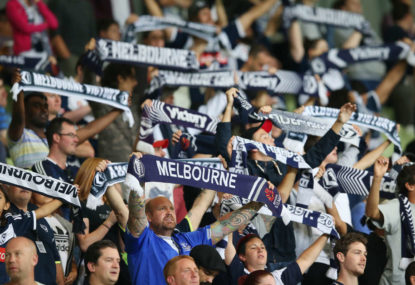As big business continues to dominate the football landscape worldwide, fan ownership is a concept that is becoming an attractive proposition for some of the game’s supporters.
Too many examples abound where clubs have plunged to devastating depths after millionaire owners have grown tired of their plaything and jumped ship, or been found guilty of fraudulent dealings.
The A-League has had its fair share of ownership mishaps itself, so could fan-controlled clubs ever become a reality in Australia?
The A-League is still at an early stage, and any suggestion that a current club could be majority-owned by fans in the next 10 years may just be a lofty pipe dream.
But is there at least a possibility of clubs creating Supporters’ Trusts, which in turn would control a percentage of a club and have an increased say in its governance?
After attending FC Union Berlin’s match against RB Leipzig in the 2. Bundesliga last weekend, which featured extensive Union protests against their opponent’s owners, the idea of fan ownership in Australia raised its head.
Union Berlin have about 12,000 members who collectively own 51 per cent of the club. This, of course, is common in Germany, through its much heralded and publicised 50+1 rule. But Union, further promoting itself as the shining light in fan ownership, also offers fans the opportunity to buy shares in the Stadion An der Alten Försterei.
The rule isn’t without hitches however, and Germany’s model isn’t perfect. Clubs still go bankrupt and teams such as Bayer Leverkusen and Wolfsburg are largely controlled by their investors – Bayer and Volkswagen respectively.
RB Leipzig, meanwhile, are entirely owned by Red Bull and have reportedly only about 300 members, all of whom are exclusively connected to the energy drink’s headquarters in Austria. The DFL allowed them entry to Germany’s second division only because the 50+1 rule lies on shaky legal ground. But that’s what Union fans were protesting about.
Considering the contrasting governance of both clubs, and the passionate opposition to RB Leipzig among most German fans, what do Australian supporters prefer? Is it too obvious and presumptuous to assume that they would fall over each other for fan ownership?
Or are we just happy enough to have a functional league, content to let FFA and millionaire owners worry about financial sustainability?
The A-League still has a lot of work to do to ensure clubs aren’t bleeding money, but why can’t Supporters’ Trusts begin emerging in order to contribute funds as well as increase fan input?
From little things big things grow, right?
Fan bases in Australia would have to take a dramatic jump to even flirt with the possibility of complete ownership, but with the help of local businesses a start could be made. Melbourne Victory or Western Sydney Wanderers are the best standing candidates. With their large following and membership numbers, could they dip their toes into part-ownership?
Say 10,000 fans committed $200 per year for a Supporters’ Trust membership, that’s $2 million. Even at $100, which isn’t out of a passionate football fan’s budget, there would be a $1 million windfall. It’s not enough to run a football club, but surely enough to own a percentage and become contributing stakeholders.
There are examples outside Germany where fan ownership has been successful, the most recent and publicised example being Portsmouth. Fraudulent and chaotic managements led to three relegations in four seasons and two bouts of administration for the seaside club. But the Pompey Supporters’ Trust and 11 local businessman stepped in to launch a takeover in 2013.
They now stand as the biggest English club to be owned by fans and are attracting gates of 16,000 in League Two. That’s on par with Queens Park Rangers, who play in the EPL under the direction of Malaysian millionaire owner Tony Fernandes.
Exeter City are another example in England, and they boast the second-longest serving manager in the professional divisions, Paul Tisdale, who’s been there for seven years. Just a short distance away from Australia, Yokohama FC are the first Japanese club to be solely owned and operated by supporters. They are almost 15 years old and compete in J. League 2.
MLS club Seattle Sounders, meanwhile, based their ownership model around Barcelona’s socios system, where every season ticket holder has a vote in major club decisions. They also have the power to kick out their general manager.
It could be a fruitful system in Australia, allowing fans to increase their say in the running of A-League clubs. They could scrutinise club decisions, as well as hold FFA to account for its governance of the A-League.
Links with grassroots football would also inevitably grow, as people in the terraces would be keen to promote local talent.
A core fan group, with a number of local businesses could even potentially takeover an A-League club. It’s not entirely out of the realms of possibility. But are there enough passionate football fans in Australia to make such a pipe dream a reality?
Admittedly the A-League has a salary cap and the competition isn’t in danger of producing a Paris Saint-Germain or Manchester City. We aren’t at the mercy of billionaire owners buying trophies, but we’re still at the mercy of millionaires who may pull the plug at any moment.
Fan ownership is therefore something Australian football could and should work towards, starting with the emergence of Supporters’ Trusts. The next question, however, is whether or not FFA would be open to the idea, and how they could bring it in.
How much power a Supporters’ Trust would hold would have to come down to a case-by-case basis, but there’s no doubt that empowering and including supporters can only help grow the game, if we’re not talking about commercial growth.
Tapping into the unique passion that lies in every football supporter could help transform the game in Australia and bring it back to the people.





























































































